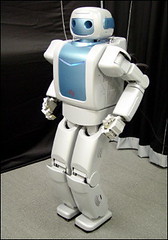U.S. Army Prepares Armed 'Robo-Soldier' for Iraq
"The Army is preparing to send 18 of these remote-controlled robotic warriors to fight in Iraq beginning in March or April.
Made by a small Massachusetts company, the SWORDS, short for Special Weapons Observation Reconnaissance Detection Systems, will be the first armed robotic vehicles to see combat, years ahead of the larger Future Combat System vehicles currently under development by big defense contractors such as Lockheed Martin and General Dynamics Corp."
From technologyreview.com post:


